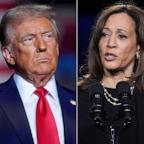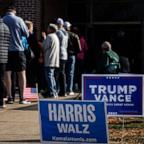
Voters, especially Democrats, are worried about the health of U.S. democracy
In the closing weeks of the campaign, members of Trump's first-term cabinet have come forward to warn voters about his anti-democratic beliefs and potential for authoritarianism should he be re-elected. John Kelly, a former chief of staff and retired four-star general, recently said Trump "falls into the general definition of fascist." Per reporting by The Atlantic, two unnamed members of his administration recalled the former president saying he "needed compared some of the rhetoric used at recent Trump rallies to historic efforts to justify authoritarian action or potential coups in the face of threats. Harris has also focused on this threat in a "closing argument" to voters, given from the same location as Trump's speech on the day of the Jan. 6, 2021, insurrection.

In May, 538 partnered with the nonpartisan research firm PerryUndem to speak to voters about the topic of democracy, and found that many undecided voters who were leaning toward Biden (the Democratic nominee at the time) were doing so because they worried about a second Trump term, the threat he might pose to democracy, and a repeat of Jan. 6. One voter in that focus group said they felt "democracy as we know it is dead" if Trump wins, while others called him a "demagogue." Those fears have likely only become more widespread as the campaign, and Trump's bombastic rhetoric have continued: Half of American said Trump is a fascist in an October ABC News/Ipsos poll.
Republican-leaning voters in our focus groups, on the other hand, were more worried about election integrity, with many repeating conspiracy theories pushed by Trump and other Republicans about the election or the events of Jan. 6. Lies and conspiracies about elections have continued to erode confidence in elections since then, especially as the Trump campaign has continued its false claims that noncitizens vote in the U.S.
Our focus groups underscored a theme of this election — deep partisan divides underlying similar fears about the fate of democracy. According to an October YouGov/The Economist poll on political violence and extremism, 55% of Americans think the U.S. is much more politically divided than it was 5 years ago and 25% think it was somewhat more divided. In the same poll, majorities of voters were concerned about various types of political extremism in the U.S., including 63% who were at least somewhat concerned about white-supremacist extremism, 57% concerned about right-wing extremism and an equal 57% concerned about left-wing extremism. Even more dire, 35% of Americans said they think it's at least somewhat likely there will be a civil war between Democrats and Republicans, while more than 20% said the U.S. may become a "communist dictatorship" and more than 25% it may become a "fascist dictatorship" in that same time span.










